Film Name: 猩球崛起:新世界 / 猩球崛起4:新世界 / Kingdom of the Planet of the Apes,Planet of the Apes 4
As I said, seeing is believing – after watching Kingdom of the Planet of the Apes, hereinafter referred to as Planet of the Apes 4, I think it’s a film worth recommending and exploring.
It’s certainly not a mindless popcorn flick, but one that requires the viewer to think about the direction of Earth’s civilisation in the ‘post-Caesar era’. Thanks to its worldview, the film has a lot of worthwhile points, such as how apes develop their own civilisation in the context of ‘technology relies on archaeology’, and whether apes and humans can coexist peacefully in the new environment.

However, logically speaking, part of the plot of Planet of the Apes 4 is a bit far-fetched, and what it wants to say is a bit ambiguous, coupled with the slow pace of the narrative ……, so from the perspective of commercial logic, I guess it won’t be a big seller, will it?
Anyway, the framework of the new series of ‘Rise of the Planet of the Apes’ has been set up, and the content is also very rich, enough for everyone to have a good chat.
[Friendly reminder: there will be spoilers below].
First of all, let’s make it clear that even though Planet of the Apes 4 is a sequel to the 2011, 2014, and 2017 Planet of the Apes 3 trilogy, it’s already a ‘soft reboot’ of sorts, and it’s definitely a bit of a bookworm in terms of setting. Only by accepting this can the film be enjoyable.
This ‘departure’ is justified by the film’s biggest mystery: why, hundreds of years after the birth of intelligence, are the apes still living a relatively primitive life, with such a low level of civilisation?
The core reason is that apes only learnt language after they gained intelligence, but they did not master writing, and they did not have a systematic knowledge base.
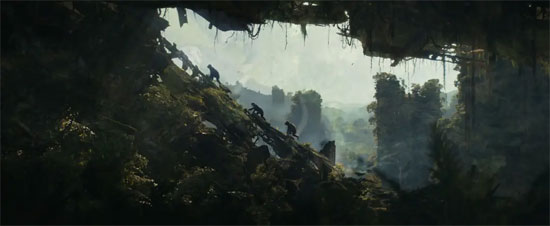
After the mass death and near-extinction of the human race, apes took over the fruits of human civilisation, but apart from a few apes who had dealings with humans and could initially use tools, the majority of apes still had to rely on their biological habits and sudden surge of intelligence to develop their own civilisation again.
Take the ‘Planet of the Apes 4’ protagonist Noah’s ‘eagle taming’ tribe as an example, their range of activities is very small, in addition to know how to use a knife and build a wooden house, there is nothing surprising, in order to survive, they also formed a culture of eagle taming, living a life of fishing and hunting.
And the ape community Caesar was in hundreds of years ago, even though they had formed a certain scale, they were unable to adequately go and learn human writing and culture, not to mention mastering the full set of knowledge system and civilisation achievements of human beings for thousands of years – for example, they learned how to shoot a gun, but they didn’t know the principle of the construction of firearms, and couldn’t repair or manufacture them, to the apes, the vast majority of human creations are either ho-hum unintelligible monstrosities or non-renewable expendable items.
Therefore, it is only natural that when Caesar, the first generation of the ‘Golden Family Tribe’, died off, the apes would sooner or later ‘degenerate’ to a level of civilisation that would correspond to their level of intelligence.
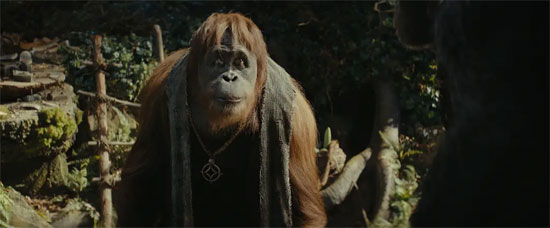
Caesar was the first elder, prophet and leader of the intelligent apes, and the apes were destined to carry on his legend for generations, but their knowledge was limited, and the only thing that has been passed down through the centuries is Caesar’s aphorism that ‘apes are strong when they are united’.
Laika from Planet of the Apes 4 is very reminiscent of Maurice, the orangutan from the old trilogy, and I’d like to speculate that Laika is a descendant of Maurice, and that their lineage of apes served as scribes, historians, and so on, and that’s why they have a much more detailed understanding of Caesar’s deeds and philosophy.
But because he didn’t know how to write (oral transmission of information is very inefficient), by the time he reached the generation of the fallen Lakka, he could only keep an empty pile of books, knowing that the symbols on the pile of books have meaning but had to scratch his head.
Under this premise, an interesting new issue arises: how to understand Caesar’s statement that ‘apes are strong when they are united’.
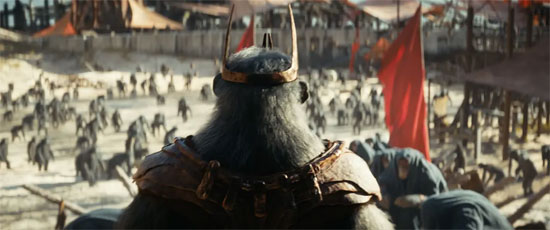
Noah’s eagle-taming tribe does not know of Caesar’s existence, and has no understanding of ‘solidarity’;
Although Laka knows a lot about Caesar and insists that ‘apes should not kill apes’, he is immersed in some kind of ‘apes and humans coexisting peacefully’ in the beautiful fantasy of ‘unity’. But he is so immersed in some kind of fantasy of ‘apes and humans living in peace’ that he knows nothing about ‘solidarity’;
The self-proclaimed Caesar’s heir, the Caesar’s motto as a tribal slogan Sesar, on the other hand, around the annihilation of other small tribes, captive enslaved a large number of apes as a drudgery, his understanding of ‘unity’ is to focus on doing great things.
To put it bluntly, this is the civilisation in the age of ignorance of natural phenomena, the spread of religion on the advanced thinking of the ‘right to interpret the scriptures and interpretation’ of the competition, that is, we usually say that the right to interpretation and the right to speak, whoever masters this power, who will be able to get more power, get more opportunities for development.
From the point of view of organisational power and results, the ‘Fusion Tribe’ under the leadership of Saisar is undoubtedly the most advanced of the ape tribes, he is not like the eagle-taming tribe that is not as simple as slash-and-burn cultivation, and is not like the Lakha that keeps the old piles of paper and reads the scriptures, he actively embraced the human organisational form, and constantly learnt human culture and technology…. …
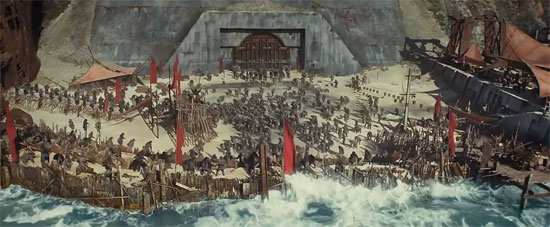
The most crucial thing is that Sesar has got hold of the most powerful army and equipped them with electric shock batons. The invincibility of the ‘Sesar’s army’ in the apes vividly illustrates the importance of ‘the weapon of criticism cannot replace the criticism of the weapon’.
Of course, the price of the rapid development of the ‘advanced civilisation’ of the Saisas is that many ‘inferior civilisations’ or ‘weak civilisations’ have been eliminated and assimilated.
This phenomenon abounds in human history, as far as the extinction of the Neanderthals, the emergence of primitive tribes, close to the bloody era of the Great Maritime Age, the erosion of modernity on the traditional society, etc., are more or less the same reason, thousands of years down the line, I do not know how many small tribes were destroyed, and how many languages gradually disappeared …… At this time, the apes, but also walking the old path of human beings in the past. The apes at this time are also following the same path as the human race did in the past.
It should be said, ‘Planet of the Apes 4’ in the Earth’s new civilisation set the framework for doing quite a good job, especially the different degrees of ape civilisation stages of development, both from the human history of the part, but also the film’s original ideas …… just in the addition of the human point of view, some places will seem awkward.
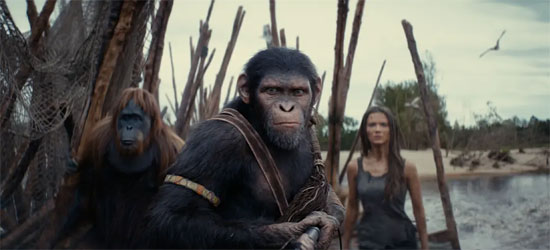
For example, the apes’ attitudes towards humans are purely exploitative, loathing and defensive, Sessa is disgusted and contemptuous while Laika is half-knowingly friendly, and Noah is a stranger to the world, which makes the first half of the film seem far-fetched (though plausible) in terms of establishing a relationship between Noah and May.
In addition, there are a few things that don’t make sense, such as the technological achievements of the remaining human beings, which seem to have been maintained a little too well after hundreds of years, and the storyline before and after May and Noah team up to open the door to the ‘treasure trove’, which is also a bit of a misnomer.
What’s worse, the pace of Planet of the Apes 4 is too slow, and the narrative is more like the old-school tone of the last century. I was fine with it because I was brainstorming as I watched it, but for more viewers, the 145-minute length is really grating. ……
There are advantages to being slow, though, and it brings in more different perspectives to consider.
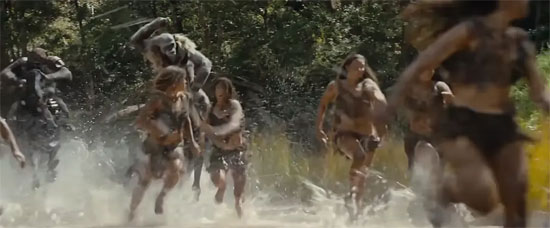
Unlike the dual perspectives (human and new species) of many AI revolts and alien invasions, many of the perspectives of the apes and humans in the Rise of the Planet of the Apes series overlap and even duplicate, which makes the film much more fleshed out in terms of the different routes of civilisation’s evolution.
In Planet of the Apes 4, there are very few humans left, and the vast majority of those who can survive in the wild have devolved into mentally retarded, non-speaking, blood-drinking savages. However, a small number of humans who are immune to the virus have retained their intelligence, and there is also a small group of humans who have remained uninfected by the virus while hiding in closed environments, and these two groups of people constitute the spark that will continue the ‘pre-apathetic human civilisation’.
At this time, the masters of the earth have been apes, although their ability to use tools and the ability to transform the environment is far less than the former human – but due to the huge gap between the population size and the material conditions of the extreme lack of the same intelligent creatures, human beings are unable to shake the status of the apes.
The asymmetrical balance between the apes’ weak power and the (small) number of humans’ strong power has opened up new interpretations and possibilities for the age-old question of the Rise of the Planet of the Apes series – can apes and humans coexist peacefully?
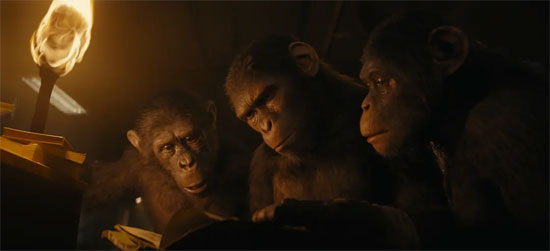
Realistically, the answer is simple: it’s hard, because humans who remember the glory days of the past are vindictive, and apes who learn of the true history will guard against it to the point of striking first, but the film still leaves open the hope of a two-pronged development.
This is where I feel most sorry for Planet of the Apes 4, as it avoids many of the most crucial issues or takes an ambiguous approach.
For example, the portrayal of Isaac, who represents the most advanced organiser and seeks to evolve technological archaeology, as a greedy and cruel tyrant, or Noah’s victory over Isaac, giving up the throne that was within his grasp and taking his people to continue living their lives as they had been before, and taking nothing of the advanced experience and technology that had been left behind by the Fusion Tribe! ……
I understand that foreigners have a deep-seated resistance to ‘unification’ and ‘centralisation’, and that the fear of technological advancement and the desire for idyllic pastoralism is also an important genre, but the film’s one-sided shielding of the apes’ desire for advanced human civilisation and its softening of the conflict between the two sides, even if it is more watchable, is ultimately part of the film’s story. Even if it is more watchable, it is ultimately an evasive film.

Aside from the above gripes, I’m basically happy with Planet of the Apes 4. The graphics are excellent, the setting is brilliant, the protagonist Noah is born in the middle of nowhere and doesn’t engage in the ‘blood of Caesar’ theory, and the relationship between May and the apes is always one of co-operation and exploitation rather than a silly, sweet, and emotional relationship, and in the end, both sides are allowed to look up at the same starry sky and wonder about the future of their tribe. They look up at the same starry sky and think about the future of their species.
Kingdom of the Planet of the Apes’ sets up a new environment to explore the topic of “how to develop civilisation” through the two generations of apes and human masters, and the time span is so large that it can be treated as a chronicle, and from this point of view, the film can be regarded as a fairly pure, hardcore science fiction film.
Please specify:Anime Phone Cases » Kingdom of the Planet of the Apes 2024 Film Review: Let me see a new story of the evolution of civilisation.